Ingeol Baek
How Do Large Vision-Language Models See Text in Image? Unveiling the Distinctive Role of OCR Heads
May 21, 2025Abstract:Despite significant advancements in Large Vision Language Models (LVLMs), a gap remains, particularly regarding their interpretability and how they locate and interpret textual information within images. In this paper, we explore various LVLMs to identify the specific heads responsible for recognizing text from images, which we term the Optical Character Recognition Head (OCR Head). Our findings regarding these heads are as follows: (1) Less Sparse: Unlike previous retrieval heads, a large number of heads are activated to extract textual information from images. (2) Qualitatively Distinct: OCR heads possess properties that differ significantly from general retrieval heads, exhibiting low similarity in their characteristics. (3) Statically Activated: The frequency of activation for these heads closely aligns with their OCR scores. We validate our findings in downstream tasks by applying Chain-of-Thought (CoT) to both OCR and conventional retrieval heads and by masking these heads. We also demonstrate that redistributing sink-token values within the OCR heads improves performance. These insights provide a deeper understanding of the internal mechanisms LVLMs employ in processing embedded textual information in images.
SAFE-SQL: Self-Augmented In-Context Learning with Fine-grained Example Selection for Text-to-SQL
Feb 17, 2025Abstract:Text-to-SQL aims to convert natural language questions into executable SQL queries. While previous approaches, such as skeleton-masked selection, have demonstrated strong performance by retrieving similar training examples to guide large language models (LLMs), they struggle in real-world scenarios where such examples are unavailable. To overcome this limitation, we propose Self-Augmentation in-context learning with Fine-grained Example selection for Text-to-SQL (SAFE-SQL), a novel framework that improves SQL generation by generating and filtering self-augmented examples. SAFE-SQL first prompts an LLM to generate multiple Text-to-SQL examples relevant to the test input. Then SAFE-SQL filters these examples through three relevance assessments, constructing high-quality in-context learning examples. Using self-generated examples, SAFE-SQL surpasses the previous zero-shot, and few-shot Text-to-SQL frameworks, achieving higher execution accuracy. Notably, our approach provides additional performance gains in extra hard and unseen scenarios, where conventional methods often fail.
Dynamic Label Name Refinement for Few-Shot Dialogue Intent Classification
Dec 20, 2024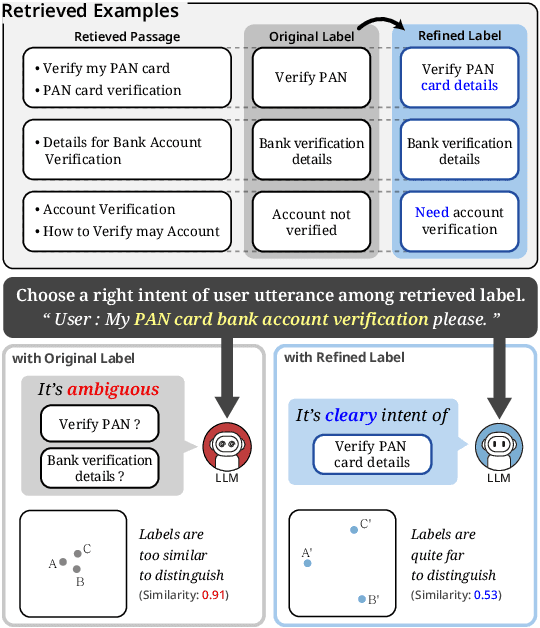

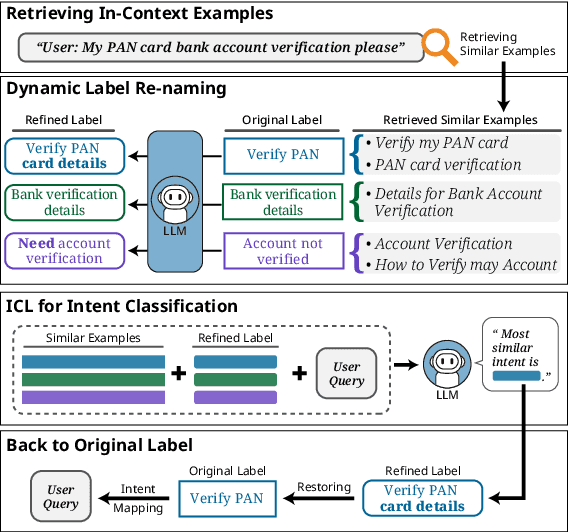
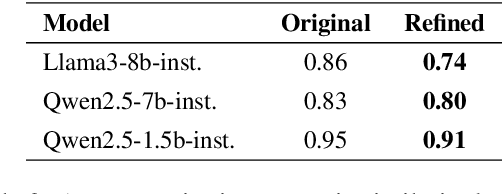
Abstract:Dialogue intent classification aims to identify the underlying purpose or intent of a user's input in a conversation. Current intent classification systems encounter considerable challenges, primarily due to the vast number of possible intents and the significant semantic overlap among similar intent classes. In this paper, we propose a novel approach to few-shot dialogue intent classification through in-context learning, incorporating dynamic label refinement to address these challenges. Our method retrieves relevant examples for a test input from the training set and leverages a large language model to dynamically refine intent labels based on semantic understanding, ensuring that intents are clearly distinguishable from one another. Experimental results demonstrate that our approach effectively resolves confusion between semantically similar intents, resulting in significantly enhanced performance across multiple datasets compared to baselines. We also show that our method generates more interpretable intent labels, and has a better semantic coherence in capturing underlying user intents compared to baselines.
Probing-RAG: Self-Probing to Guide Language Models in Selective Document Retrieval
Oct 17, 2024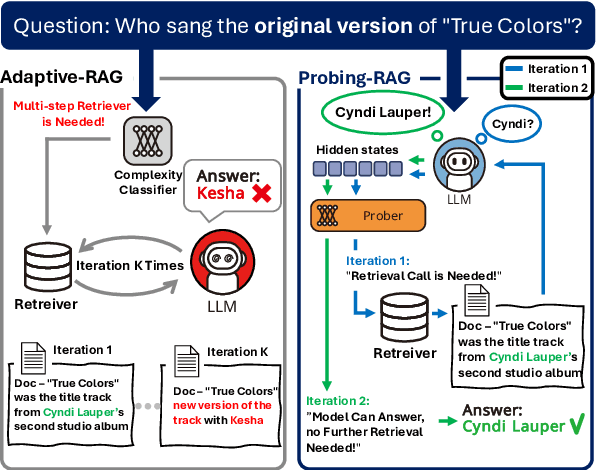

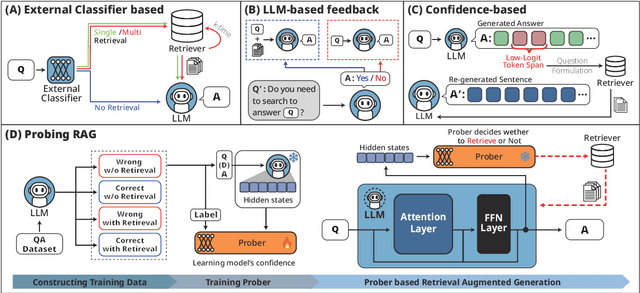
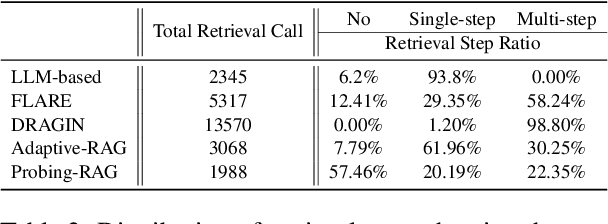
Abstract:Retrieval-Augmented Generation (RAG) enhances language models by retrieving and incorporating relevant external knowledge. However, traditional retrieve-and-generate processes may not be optimized for real-world scenarios, where queries might require multiple retrieval steps or none at all. In this paper, we propose a Probing-RAG, which utilizes the hidden state representations from the intermediate layers of language models to adaptively determine the necessity of additional retrievals for a given query. By employing a pre-trained prober, Probing-RAG effectively captures the model's internal cognition, enabling reliable decision-making about retrieving external documents. Experimental results across five open-domain QA datasets demonstrate that Probing-RAG outperforms previous methods while reducing the number of redundant retrieval steps.
Crafting the Path: Robust Query Rewriting for Information Retrieval
Jul 17, 2024Abstract:Query rewriting aims to generate a new query that can complement the original query to improve the information retrieval system. Recent studies on query rewriting, such as query2doc (Q2D), query2expand (Q2E) and querey2cot (Q2C), rely on the internal knowledge of Large Language Models (LLMs) to generate a relevant passage to add information to the query. Nevertheless, the efficacy of these methodologies may markedly decline in instances where the requisite knowledge is not encapsulated within the model's intrinsic parameters. In this paper, we propose a novel structured query rewriting method called Crafting the Path tailored for retrieval systems. Crafting the Path involves a three-step process that crafts query-related information necessary for finding the passages to be searched in each step. Specifically, the Crafting the Path begins with Query Concept Comprehension, proceeds to Query Type Identification, and finally conducts Expected Answer Extraction. Experimental results show that our method outperforms previous rewriting methods, especially in less familiar domains for LLMs. We demonstrate that our method is less dependent on the internal parameter knowledge of the model and generates queries with fewer factual inaccuracies. Furthermore, we observe that Crafting the Path has less latency compared to the baselines.
 Add to Chrome
Add to Chrome Add to Firefox
Add to Firefox Add to Edge
Add to Edge